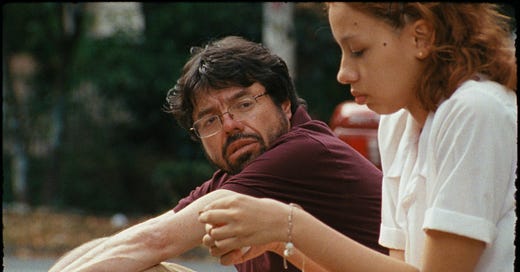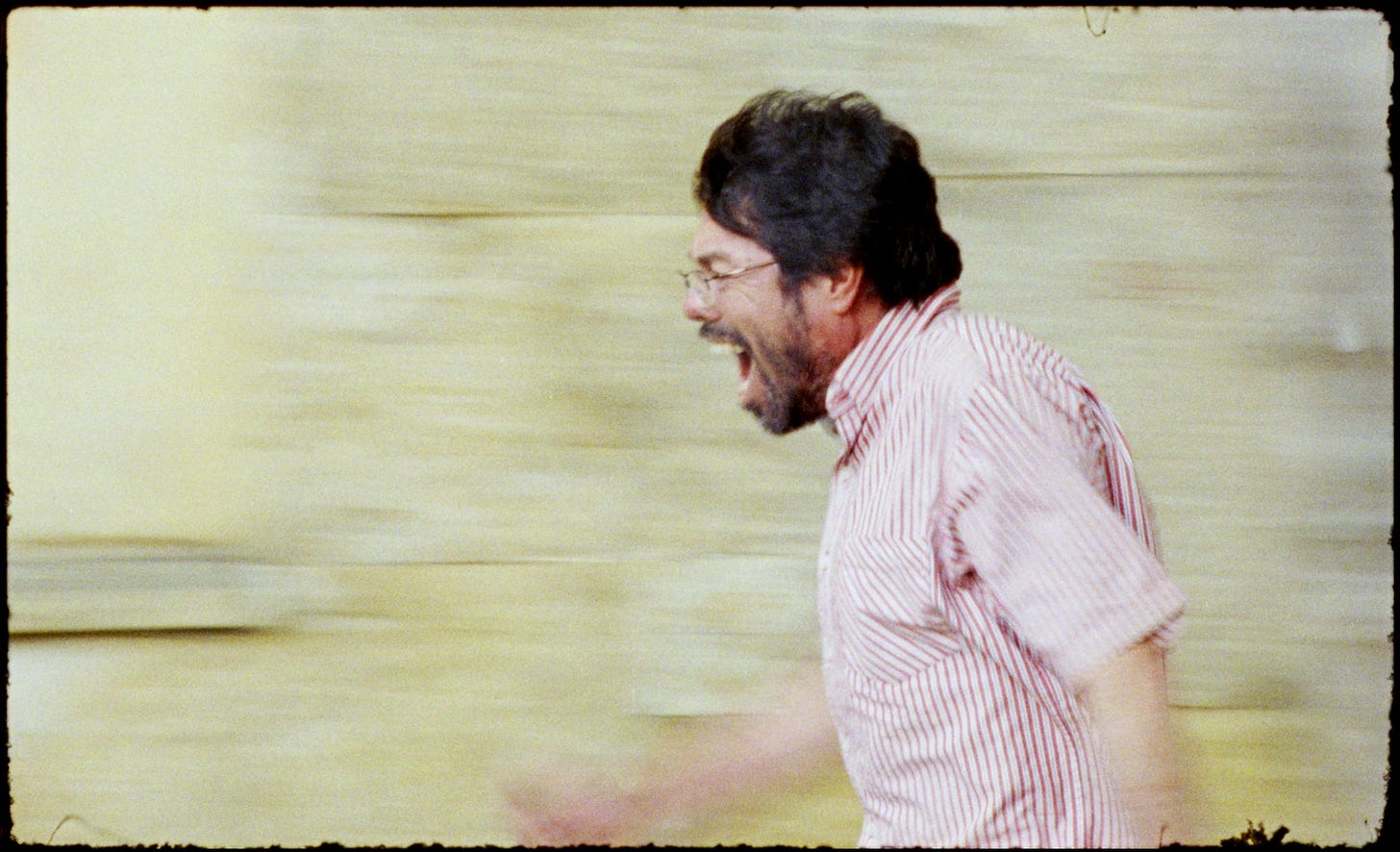Oscar Restrepo é o arquétipo do poeta que acredita que a sinceridade dos seus versos está na forma niilista como encara a vida. Ele ameaça à família suicidar-se, amaldiçoa o destino, embriaga-se até acreditar em esquemas financeiros, perder a sua dignidade e dormir na rua. Parece à primeira vista o idealista do pior tipo, oferecendo críticas ao conterrâneo Gabriel García Márquez, que teria escrito para reconhecimento próprio, e exaltando o irlandês Oscar Wilde, citando-o “Onde há dor, há solo sagrado”. A poesia só existira nela mesma, e todas as demais formas poéticas não seriam diferentes do que o clipe musical chiclete e genérico que bateu mais de 100 mil visualizações no YouTube. A arte verdadeira é a dele, e a dos raros que celebra; as demais manifestações são mera farsa.
É essa a figura central do segundo longa-metragem do roteirista e diretor colombiano Símon Mesa Soto, Un Poeta, interpretado pelo ator não profissional Ubeimar Rios, em uma daquelas atuações em que parece impossível dissociar a pessoa do personagem. A aparência decrépita, a pele oleosa, o cabelo ensebado e desgrenhado, e a camisa aberta no terceiro botão, cujo encardido cheira a álcool para vencer a barreira do audiovisual, parece que somos capazes de conhecer Oscar apenas encarando-o à distância, perdido e desequilibrado, depois de beber sem parar, como se o martírio fosse capaz de extrair a poesia incapaz de deixar o corpo dele naturalmente. É esperado que Oscar more sob o mesmo teto da mãe ainda, a considerar a forma infantilmente contrariada como fala ‘Ma’ após ter o pedido negado.
Que Simon complexifique esse personagem, ainda que a partir de recursos básicos de associação e compensação, é o mérito da narrativa em que Oscar, para ajudar a pagar os estudos superiores da filha Daniela, decide aceitar o emprego de professor em uma escola pública de um bairro pobre. Lá, aprende que a jovem Yurlady (Rebeca Andrade) tem uma voz poética bruta e que pode ser desenvolvida com a condução correta. Ele a convida para a associação de que faz parte e, rapidamente, Yurlady está disputando as competições locais de poesia, patrocinadas por uma benfeitora holandesa, incapaz de pronunciar corretamente o nome da jovem, embora entusiasta o bastante para chorar sob efeito de suas palavras escritas. O melhor de Un Poeta está em como a narrativa é eficiente em criticar a representatividade forçada das artes, ou comparar a tragédia de grupos minoritários e grupos subrepresentados. A arte não é melhor por ter conteúdo social, racial, ou por dialogar com a realidade da comunidade onde o artista está, pois sequer pode impedir as bombas de explodirem nem transformar o real concretamente. O que qualifica a arte é a forma com que esta acessa a quem é exposto, e aí, se houver uma transformação, não que precise haver, é do indivíduo, antes da realidade.
Afinal, muitas das pessoas que estão em situações precárias, por exemplo, as jovens de 15 anos em lares instáveis e que, na idade adulta, já tem 2 ou 3 filhos para cuidar, mal tem tempo para criar a arte, que é objeto de consumo de quem tenha tempo e dinheiro para usufruir dela, alimentar a vaidade através da empatia, e até mesmo, muitas vezes, ajudar a lubrificar os mecanismos de manutenção do status quo. Un Poeta revela isso a partir de diálogos e reflexões eficazes mesmo que expositivas: “Por que eu vou querer ser uma grande poeta, paga bem?”, é o que pensa Yurlady, cujo comportamento é o de ajudar a família e pensar no próximo. Isso já não a torna uma poeta? Revela ainda na maneira como a adolescente é atraída pelo círculo de poetas que deveria tê-la acolhido. Quem mantém a integridade é Oscar, embora a falta de traquejo social o torne facilmente um bode expiatório da narrativa e do espectador.
Tudo reforçado pela direção de fotografia, que opta por uma câmera na mão bem mais instável do que o habitual, movimentada de forma errática e improvisada, como o jazz da trilha sonora sonora, e cuja imagem é recortada no quadro de uma forma rústica. A montagem é brusca: o corte após os títulos dos capítulos interrompe a canção, e ajuda a estabelecer o humor de um filme que é, na verdade, a história de amadurecimento de um homem, um pai e um poeta, dentro do mundo imperfeito em que está. Um mundo contraditório, assim como é Oscar e a nossa relação com esse personagem, pois se é a imperfeição de fato que se frutifica na beleza das estrofes poéticas (ou na arte que nós amamos), então preferiria um mundo sem arte, pois aí saberia que não haveria dores e males de toda sorte. Do mesmo jeito, eu jamais poderia conceber um mundo sem arte. A não ser que pudesse existir uma poesia alegre, que não reflete as sombras de dentro nem as mazelas de fora, apenas se expressa porque o ser humano é poesia. Bem, seja como for a minha relação de amor e ódio com Oscar, a com Un Poeta é multifacetada, ainda quando o roteiro seja esquemático, porque se o indivíduo ou o mundo é falho e imperfeito, também são as poesias.
O filme está selecionado na mostra Um Certo Olhar do Festival de Cannes.
English review
Oscar Restrepo is the archetype of the poet who believes that the sincerity of his verses lies in the nihilistic way he views life. He threatens his family with suicide, curses fate, gets drunk to the point of believing in financial schemes, loses his dignity and sleeps on the streets. At first glance, he seems like the worst kind of idealist, criticizing his fellow countryman Gabriel García Márquez, who would have written for his own recognition, and extolling the Irishman Oscar Wilde, quoting him as saying “Where there is pain, there is sacred ground”. Poetry only exists in itself, and all other poetic forms are no different than the generic, catchy music video that has reached over 100 thousand views on YouTube. True art is his, and that of the rare people he celebrates; other manifestations are mere farce.
This is the central figure in the second feature film by Colombian screenwriter and director Símon Mesa Soto, Un Poeta, played by non-professional actor Ubeimar Rios, in one of those performances in which it seems impossible to dissociate the person from the character. With his decrepit appearance, oily skin, greasy and disheveled hair, and his shirt open at the third button, whose grime smells of alcohol to overcome the audiovisual barrier, it seems that we are able to get to know Oscar just by looking at him from a distance, lost and unbalanced, after drinking non-stop, as if martyrdom were capable of extracting the poetry incapable of leaving his body naturally. It is expected that Oscar still lives under the same roof as his mother, considering the childishly annoyed way in which he says ‘Ma’ after having his request denied.
That Simon makes this character more complex, even if only through basic resources of association and compensation, is the merit of the narrative in which Oscar, in order to help pay for his daughter Daniela's higher education, decides to accept a job as a teacher at a public school in a poor neighborhood. There, he learns that the young Yurlady (Rebeca Andrade) has a raw poetic voice that can be developed with the right guidance. He invites her to the association he is part of and, soon, Yurlady is competing in local poetry competitions, sponsored by a Dutch benefactor, unable to pronounce the young woman's name correctly, although enthusiastic enough to cry under the effect of her written words. The best thing about Un Poeta is how the narrative is efficient in criticizing the forced representation of the arts, or comparing the tragedy of minority groups and underrepresented groups. Art is not better for having social or racial content, or for dialoguing with the reality of the community where the artist is, because it cannot even stop bombs from exploding or concretely transform reality. What qualifies art is the way it reaches those who are exposed to it, and then, if there is a transformation, not that there needs to be, it is the individual's, before reality.
After all, many people who are in precarious situations, for example, 15-year-old girls in unstable homes and who, as adults, already have 2 or 3 children to care for, barely have time to create art, which is an object of consumption for those who have the time and money to enjoy it, to feed their vanity through empathy, and even, often, to help lubricate the mechanisms of maintaining the status quo. Un Poeta reveals this through dialogues and reflections that are effective, even if expository: “Why would I want to be a great poet, it pays well?”, is what Yurlady thinks, whose behavior is to help her family and think of others. Doesn't that already make her a poet? It also reveals the way in which the teenager is attracted to the circle of poets that should have welcomed her. Oscar is the one who maintains the integrity, although his lack of social skills easily makes him a scapegoat for the narrative and the viewer.
All this is reinforced by the cinematography, which opts for a hand-held camera that is much more unstable than usual, moving erratically and improvisedly, like the jazz soundtrack, and whose image is cropped in the frame in a rustic way. The editing is abrupt: the cut after the chapter titles interrupts the song, and helps to establish the mood of a film that is, in fact, the coming-of-age story of a man, a father and a poet, within the imperfect world in which he finds himself. A contradictory world, just like Oscar and our relationship with this character, because if it is indeed imperfection that bears fruit in the beauty of poetic stanzas (or in the art that we love), then I would prefer a world without art, because then I would know that there would be no pain and evil of all kinds. In the same way, I could never conceive of a world without art. Unless there could be a joyful poetry, which does not reflect the shadows within nor the ills without, but simply expresses itself because the human being is poetry. Well, whatever my love-hate relationship with Oscar, my relationship with Un Poeta is multifaceted, even when the script is schematic, because if the individual or the world is flawed and imperfect, so are the poems.
The film is selected in the Un Certain Regard section at the Cannes Film Festival.






